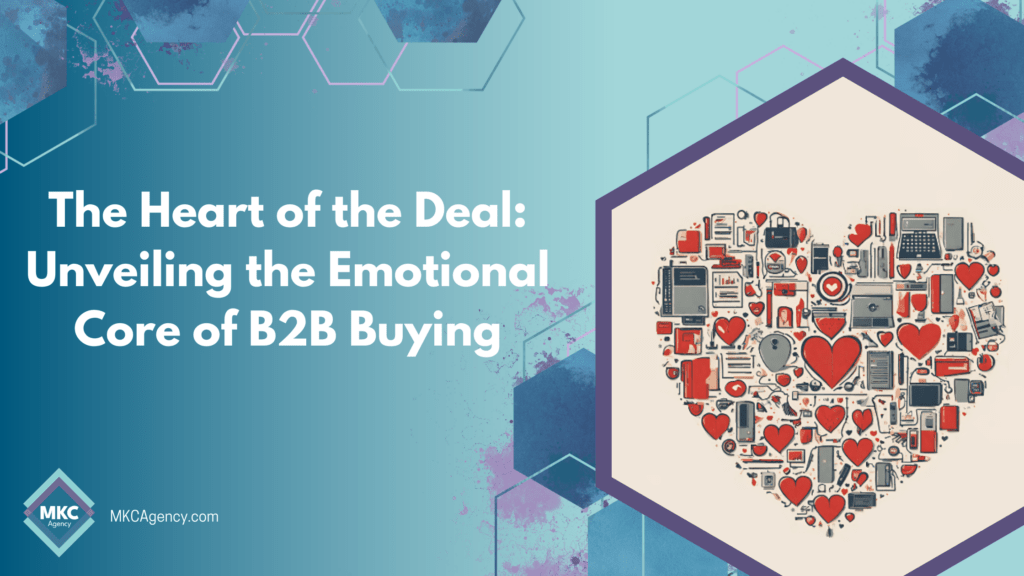In the streamlined corridors of B2B transactions, where spreadsheets, ROI, and KPIs dominate the conversation, there lies an often-overlooked truth – the heartbeat of decision-making is not purely rational; it’s profoundly emotional.
Kandace Barker, Head of B2B at Initiative, captures this sentiment perfectly: “There’s this fallacy that business decision-making isn’t driven by emotion. All decision-making is emotional – people are still people. When you think about authenticity, it’s about connecting with people on a level that doesn’t feel forced.”
This insight pierces through the conventional armor of B2B marketing strategies, revealing a core truth: despite the formal veneer of business dealings, the decisions we make are deeply human, fueled by the same emotions that guide our personal choices.
The Emotional Heartbeat of B2B Buying
Despite the high-stakes and complex nature of B2B transactions, the decision-making process is far from being purely analytical. In fact, a study highlighted by Google in partnership with CEB’s Marketing Leadership Council and Motista shows that B2B customers form stronger emotional connections to their vendors and service providers than B2C consumers do, with seven out of nine B2B brands studied surpassing the 50% mark in emotional connections (Think with Google).
This might initially seem surprising, but when you consider the personal risk involved in B2B purchases—such as the potential impact on one’s career or the success of one’s team—the importance of emotional connection becomes clear. The fear of making a wrong decision, and the trust and confidence placed in a vendor, all play into the deeply emotional part of making business decisions.
Emotion: The Invisible Thread in Business Decisions
- Trust and Confidence: The foundation of any B2B relationship. Buyers need to feel certain they’re making the right choice, not just for their budgets, but for their teams and career trajectories.
- Fear and Risk Aversion: The prospect of change is fraught with uncertainty. Decision-makers are emotionally inclined to choose solutions that promise security and stability.
- Ambition and Aspiration: Businesses aspire to grow and evolve. Solutions that speak to these aspirations, promising innovation and leadership, resonate on an emotional level.
- Peace of Mind: Beyond the nuts and bolts of service agreements lies the craving for reassurance. Buyers seek the emotional comfort of knowing they’re supported.
Emotions Drive B2B Decisions More Than We Think
The underlying emotions in B2B transactions are crucial, influencing decision-makers even in what appear to be rational, measured buying processes. Emotional marketing research reveals that B2B buyers are significantly more influenced by their emotional perceptions of a brand than by objective assessments of value (Einstein Marketer).
A common misunderstanding is that B2B decisions are driven purely by the search for business value. However, with offerings often becoming commoditized, and differences between competitors minimal, emotional factors—such as trust, confidence, and the desire for personal and professional growth—play a pivotal role in the final decision.
Fostering Authentic Connections
Authenticity is the bridge between your business and your clients. It’s about showing up as genuine problem-solvers, understanding the fears, aspirations, and challenges your clients face. This emotional resonance can’t be fabricated. It requires a deep understanding of your audience, a commitment to transparency, and an earnest desire to contribute to their success.
Implementing Emotional Intelligence in Your B2B Strategy
- Storytelling: Share success stories that highlight relief, satisfaction, and achievement – emotions your prospects yearn to feel.
- Personalization: Tailor your communications to address the specific concerns and aspirations of each decision-maker.
- Active Listening: Engage in conversations that allow you to unearth the emotional drivers behind each purchase.
- Consistency and Reliability: Build trust through consistent actions and reliable service, reinforcing the emotional decision to choose your brand.
Understanding the emotions of your buyer personas and personalizing messages to cater to these emotions are critical steps for integrating emotional intelligence into your B2B strategy. This approach not only fosters a deeper connection with potential buyers but also differentiates your brand in a crowded market (Einstein Marketer).
For instance, creating content that evokes positive emotions like confidence and optimism can significantly encourage decision-making. This strategy of tapping into the emotional drivers of your audience can transform the effectiveness of your marketing efforts, making your brand not just a vendor but a trusted partner in their success.
The B2B buying process is an amalgamation of numbers and narratives, facts and feelings. Acknowledging the emotional undercurrents of business decisions is not a sign of weakness; it’s an avenue to forge stronger, more meaningful connections. As Barker insightfully points out, at the heart of B2B transactions are human beings making decisions not just with their heads, but with their hearts. In recognizing this, businesses can craft strategies that resonate on a truly human level, transcending traditional transactional dynamics to build lasting partnerships.

